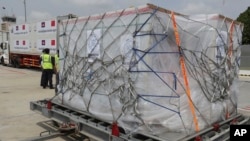The government will start vaccinating Cambodians with the recently-purchased CoronaVac COVID-19 vaccine from Chinese firm Sinovac Biotech, while also expanding priority groups to legislature staffers, garment workers and public utility workers.
Cambodia received 1.5 million doses of the CoronaVac vaccine earlier this week, purchased for $15 million. Before, the government had used 324,000 doses of the Indian-made AstraZeneca vaccine and a donation of 600,000 doses of the Sinopharm vaccine, with an additional 700,000 doses expected to arrive Wednesday evening.
The Ministry of Health also increased the priority groups that will get the vaccine, including National Assembly and Senate officials and their families, news reporters, subnational officials and armed forces personnel, Electricite du Cambodge staff, lawyers at the Khmer Rouge Tribunal and garment workers.
“The vaccines have been tested for safety and effectiveness and have been in use in the region and in the world where many countries have been using it to vaccinate millions of their population,” the statement reads.
Youk Sambath, a Ministry of Health spokesperson, said last week that the Sinovac vaccine was as effective as the Sinopharm vaccine. But, while Sinopharm cannot be used on those aged over 60 years, Sinovac could be used for all adults, she said.
Yang Sophorn, who heads the Cambodian Confederation of Union, said it was good news that garment workers were being added as a priority group. She said the lack of proper information had also cast doubts among workers about the vaccines.
“I think the information that garment workers received is limited. Thus, it could confuse them, leading to some reluctance to get vaccinated,” she said.
Meas Nee, a social and political analyst, said it was normal for any country to have priority groups since vaccine availability is limited. He said the government still needs to reassure citizens to take the Chinese vaccines.
“I see that the government is still finding it hard to instill confidence among the citizens to receive the Chinese vaccines because the question of their quality is still uncertain,” Meas Nee said.
The Health Ministry reported 63 new cases on Wednesday, taking the total case count to more than 2,400 since the start of the pandemic. More than 1,900 COVID-19 cases have been reported since February 20, and 13 confirmed deaths.




